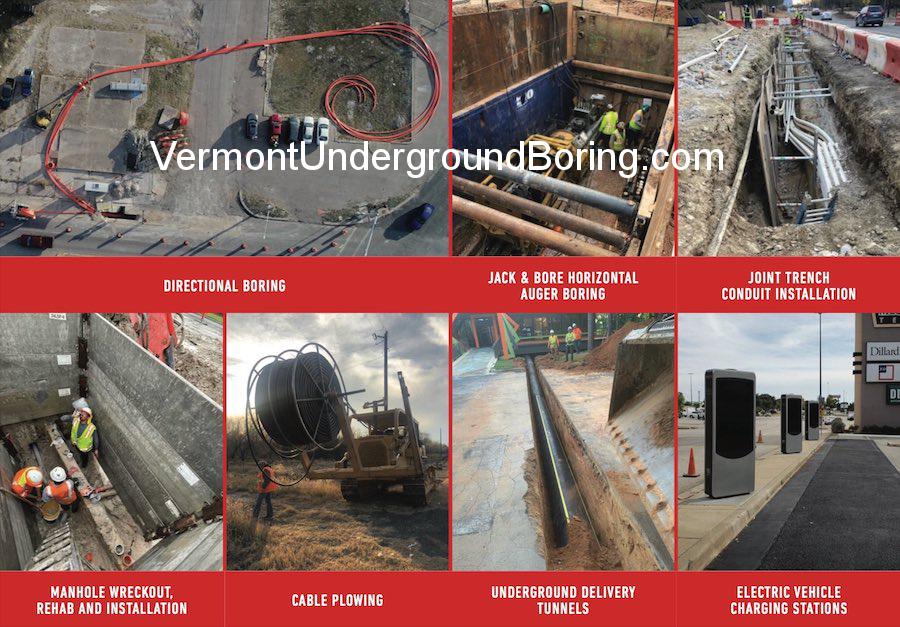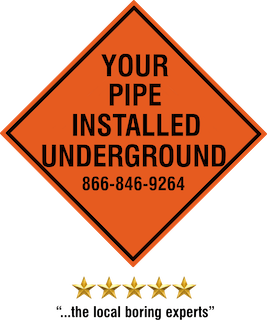Underground Utility Contractors
Vermont Underground Boring - Underground Utility Contractors
Underground Utility Contractors specialize in installing and maintaining utility infrastructure below the surface. They employ a variety of trenchless and traditional techniques tailored to specific project requirements. Here’s how each method and service is utilized:
Vermont Underground Boring - Underground Utility Contractors Companies
Trenchless Methods
- Horizontal Directional Drilling (HDD):
- Ideal for installing pipes and conduits under obstacles like roads, rivers, and existing utilities.
- HDD is commonly used for electric, fiber optic cables, water lines, oil & gas pipelines, and sewer systems.
- It minimizes surface disruption and is cost-effective over long distances.
- Directional Boring:
-
- Similar to HDD but often used for smaller-scale projects.
- Allows precise installation of utilities like electric and fiber cables with minimal surface impact.
- Horizontal Auger Boring (Jack and Bore):
-
- Used for larger pipes, such as sewer and water mains.
- The method involves jacking a casing pipe forward while simultaneously boring through the ground, ideal for stable soil conditions.
Open Cut and Conventional Methods
- Duct Bank Construction:
-
- Involves installing multiple conduits encased in concrete to protect cables for electric and fiber networks.
- Often used in urban environments for redundancy and durability.
- Manhole Installation:
-
- Critical for access to underground systems for maintenance, repair, or upgrades.
- Installed during conduit and duct bank construction for utilities like fiber optics, electric, and sewer.
- Conduit Construction and Installation:
-
- Ensures proper routing of cables or pipelines for water, sewer, electric, and communications utilities.
- Conduits provide protection and organizational benefits for long-term utility reliability.
- Joint Trench Installation:
-
- Combines multiple utilities (e.g., electric, fiber, water, sewer) in a single trench, optimizing space and reducing excavation costs.
- Ideal for residential and commercial developments.
Utility-Specific Applications
- Electric and Fiber Installation:
-
- HDD and trenchless methods are often used to lay high-voltage electric lines or fiber-optic cables over long distances with minimal environmental impact.
- Sewer and Water Lines:
-
- Gravity-driven systems often require precise grade and alignment, achievable with jack and bore or HDD.
- Oil & Gas Pipelines:
-
- Large-diameter HDD is used for crossing obstacles like highways or waterways while laying pipelines underground.
- Irrigation Systems:
-
- Underground piping for agricultural and landscaping irrigation is installed using directional boring to avoid disrupting fields or landscaped areas.
Road Moves and Relocations
- Utility Relocations:
-
- When roads are expanded or altered, underground utilities may need to be relocated or protected.
- Contractors use HDD, jack and bore, or trenching to adjust utility positions without major disruptions.
Benefits of Advanced Techniques:
- Reduced Environmental Impact: Trenchless methods limit surface disruption, preserving ecosystems and urban landscapes.
- Cost Efficiency: Eliminates the need for extensive excavation and restoration, saving time and resources.
- Precision: Advanced equipment ensures accurate installation even in complex urban or natural environments.
Vermont Underground Boring - Underground Utility Contractors Near Me
This versatility makes Underground Utility Contractors essential for modern infrastructure projects across residential, commercial, and industrial sectors.


